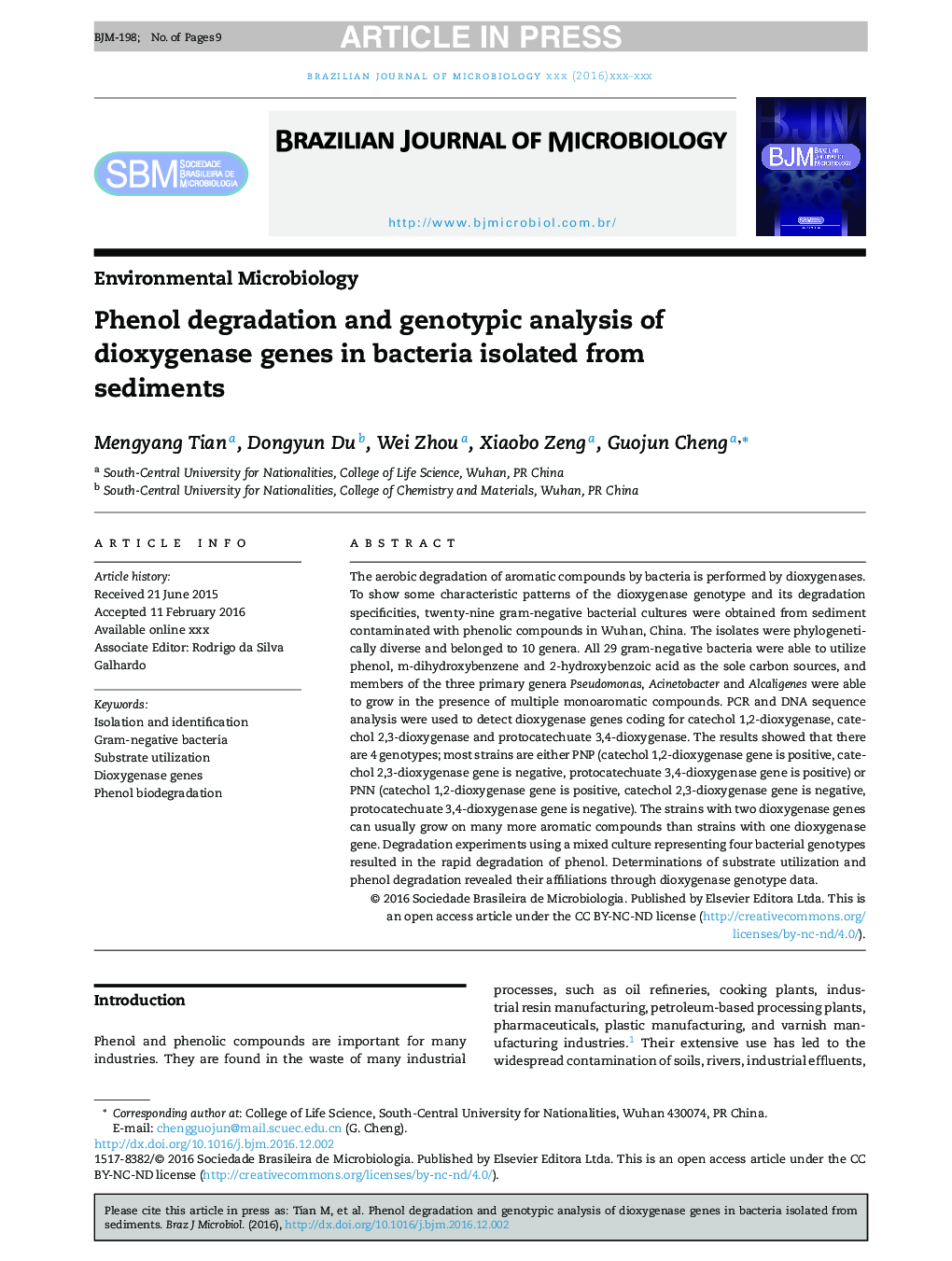| کد مقاله | کد نشریه | سال انتشار | مقاله انگلیسی | نسخه تمام متن |
|---|---|---|---|---|
| 8842647 | 1615777 | 2017 | 9 صفحه PDF | دانلود رایگان |
عنوان انگلیسی مقاله ISI
Phenol degradation and genotypic analysis of dioxygenase genes in bacteria isolated from sediments
ترجمه فارسی عنوان
تجزیه فنل و تجزیه ژنوتیپ های ژن های دیوکسیژناز در باکتری های جدا شده از رسوبات
دانلود مقاله + سفارش ترجمه
دانلود مقاله ISI انگلیسی
رایگان برای ایرانیان
کلمات کلیدی
جداسازی و شناسایی، باکتری های گرم منفی، استفاده از بستر، ژن های دی اکسیژناز، تجزیه زیستی فنل،
موضوعات مرتبط
علوم زیستی و بیوفناوری
ایمنی شناسی و میکروب شناسی
میکروبیولوژی و بیوتکنولوژی کاربردی
چکیده انگلیسی
The aerobic degradation of aromatic compounds by bacteria is performed by dioxygenases. To show some characteristic patterns of the dioxygenase genotype and its degradation specificities, twenty-nine gram-negative bacterial cultures were obtained from sediment contaminated with phenolic compounds in Wuhan, China. The isolates were phylogenetically diverse and belonged to 10 genera. All 29 gram-negative bacteria were able to utilize phenol, m-dihydroxybenzene and 2-hydroxybenzoic acid as the sole carbon sources, and members of the three primary genera Pseudomonas, Acinetobacter and Alcaligenes were able to grow in the presence of multiple monoaromatic compounds. PCR and DNA sequence analysis were used to detect dioxygenase genes coding for catechol 1,2-dioxygenase, catechol 2,3-dioxygenase and protocatechuate 3,4-dioxygenase. The results showed that there are 4 genotypes; most strains are either PNP (catechol 1,2-dioxygenase gene is positive, catechol 2,3-dioxygenase gene is negative, protocatechuate 3,4-dioxygenase gene is positive) or PNN (catechol 1,2-dioxygenase gene is positive, catechol 2,3-dioxygenase gene is negative, protocatechuate 3,4-dioxygenase gene is negative). The strains with two dioxygenase genes can usually grow on many more aromatic compounds than strains with one dioxygenase gene. Degradation experiments using a mixed culture representing four bacterial genotypes resulted in the rapid degradation of phenol. Determinations of substrate utilization and phenol degradation revealed their affiliations through dioxygenase genotype data.
ناشر
Database: Elsevier - ScienceDirect (ساینس دایرکت)
Journal: Brazilian Journal of Microbiology - Volume 48, Issue 2, AprilâJune 2017, Pages 305-313
Journal: Brazilian Journal of Microbiology - Volume 48, Issue 2, AprilâJune 2017, Pages 305-313
نویسندگان
Mengyang Tian, Dongyun Du, Wei Zhou, Xiaobo Zeng, Guojun Cheng,
